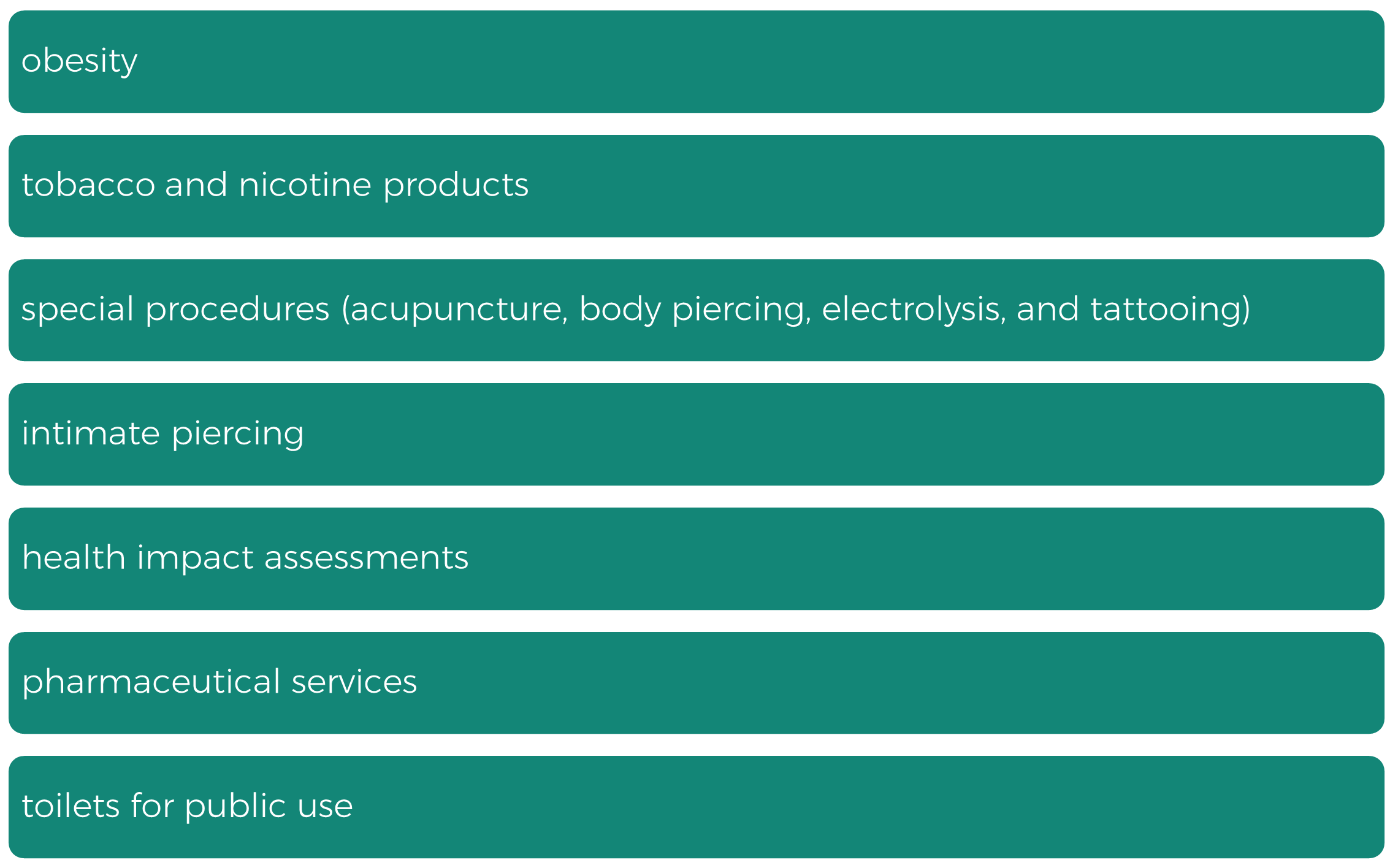The Public Health (Wales) Act 2017 received Royal Assent on 3 July 2017. The Act aims to address a number of specific public health concerns. It includes provisions relating to:

Some parts of the Act are in force, others are at various stages of development. In this article, we set out progress made in implementing the different elements of the Act.
Part 2 Obesity
Part 2 of the Act requires the Welsh Government to publish and review a national strategy on preventing and reducing obesity.
|
The Welsh Government published its Healthy Weight: Healthy Wales strategy in October 2019. The strategy has been accompanied by:
An ‘evaluability assessment’ was published in December 2022, which looked at how the strategy could be evaluated and the data needed. Further information: The Health and Social Care Committee is carrying out an inquiry into preventing obesity. Its call for evidence closes in June 2024. |
Part 3 Tobacco and nicotine products
Chapter 1 re-states restrictions on smoking in enclosed and substantially enclosed public and work places, and extends the smoke-free requirements to further settings in Wales. It includes provision to extend the restrictions on smoking to additional premises or vehicles, where it’s considered this is ‘likely to contribute towards the promotion of the health of the people of Wales’.
|
The Smoke-free Premises and Vehicles (Wales) Regulations 2020 came into force on 1 March 2021. They replace previous regulations and restate the existing smoking ban. They also extend the ban to hospital grounds, school grounds, public playgrounds, and outdoor care settings for children. The Welsh Government published guidance on the changes to smoke-free legislation to support implementation. Further information: The Welsh Government published its tobacco control strategy - A smoke-free Wales – in July 2022, setting out its ambition for Wales to be smoke-free by 2030. This is accompanied by a tobacco control delivery plan for 2022 to 2024. |
Chapter 2 establishes a national register of retailers of tobacco and nicotine products. It will be an offence for retailers to sell tobacco/nicotine products from premises (including mobile units) in Wales if they are not on the national register.
Chapter 3 provides Welsh Ministers with a regulation-making power to add to the offences which contribute to a Restricted Premises Order (RPO) in Wales. (An RPO prohibits the sale from a premises of any tobacco products to any person, by the business or any of its staff for a period of up to one year).
Chapter 4 prohibits the handing over of tobacco and/or nicotine products to a person under the age of 18. This relates to situations where, for example, a delivery driver knowingly hands over tobacco or nicotine products to someone under the age of 18 who is unaccompanied by an adult.
|
Chapters 2, 3, and 4 are not yet enacted. A Tobacco and Vapes Bill is currently progressing through the UK Parliament. This aims to update and strengthen a number of areas of existing legislation and regulation around tobacco and vapes. The Welsh Government will consider where additional strengthening may be needed once the UK Bill has completed its passage. |
Part 4 Special procedures
The Act creates a mandatory licensing scheme for practitioners and businesses carrying out special procedures in Wales. The four procedures specified in the Act are acupuncture, body piercing, electrolysis, and tattooing. It will be an offence for a practitioner to carry out any of these special procedures without a licence, or to perform any procedure from premises or vehicles that are not approved. There is provision to add to the list of special procedures (or to remove procedures) via regulations, to take account of new practices and changing trends, and any emerging evidence of public health risk.
|
In 2023, the Welsh Government consulted on the principles of a mandatory licensing scheme, and said it intended to commence this part of the Act and implement the licensing scheme by making regulations. The Welsh Government consulted on the draft regulations and statutory guidance for mandatory licensing of special procedures in spring 2024. |
Part 5 Intimate piercing
The Act prohibits the intimate piercing of a person who is under 18 in Wales, in any setting. It will also be an offence to make arrangements to perform such a procedure on a person under 18. ‘Intimate piercing’ includes piercings of the nipples, breast, genitalia, buttocks, or tongue.
|
Part 5 of the Act (intimate piercing) came into force on 1 February 2018. The Welsh Government issued guidance for businesses and practitioners, and separate guidance for local authority enforcement officers. The Prescribed Objects for Intimate Piercing (Wales) Regulations 2019 came into force on 1 August 2019. They define ‘objects’ used in intimate piercing procedures and widen the scope of the existing legislation which only captured jewellery. |
Part 6 Health impact assessments
The Act places a duty on the Welsh Ministers to make regulations requiring public bodies to carry out health impact assessments in specified circumstances. (Health impact assessments (HIA) are described as ‘a systematic means of taking health into account as part of decision making and planning processes).
|
The Welsh Government consulted on draft health impact assessment regulations over winter 2023-24. |
Part 7 Pharmaceutical services
Under the Act, Health Boards will be required to prepare and publish ‘pharmaceutical needs assessments’ for their areas. The Act amends the current ‘control of entry’ test so decisions on applications to join a Health Board’s pharmaceutical list will be based on whether the application meets the needs identified in the local pharmaceutical needs assessment.
|
Parts 1 to 4 and 9 to 11 of the National Health Service (Pharmaceutical Services) (Wales) Regulations 2020 came into force on 1 October 2020. Parts 5 to 8 came into force on 1 October 2021. The Welsh Government published guidance for health boards on their duties re. pharmaceutical needs assessment. |
Part 8 Provision of toilets
The Act requires each local authority in Wales to prepare and publish a local toilets strategy. This must include an assessment of their community’s need for toilets (including changing facilities for babies and Changing Places facilities for disabled people), and must set out how the local authority proposes to meet this need.
Local authorities must consult on their draft strategies. The Welsh Government must issue guidance to local authorities about the preparation, review and publication of strategies. The Act does not place a duty on local authorities to provide or maintain public toilets, nor is there a specific requirement for local authorities to implement their toilet strategies.
|
From 31 May 2018, local authorities had one year to assess their community’s need for toilets and put a strategy in place. The Welsh Government published statutory guidance for local authorities in August 2018. Local toilet strategies are published on local authorities’ websites. Further information: A national toilet map is available on DataMapWales. This includes toilets identified by local authorities as available for public use. The Welsh Government published guidance for local authorities on how to submit toilet location data. |
Article by Philippa Watkins, Senedd Research, Welsh Parliament






